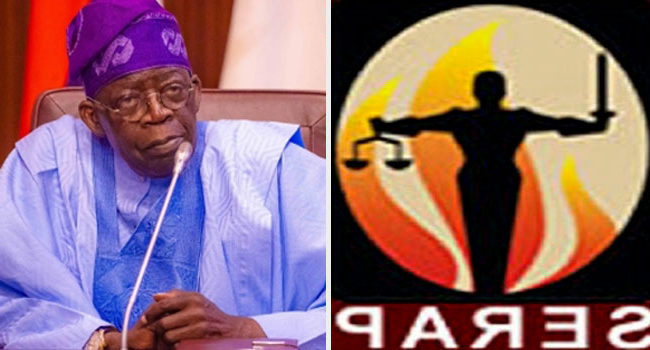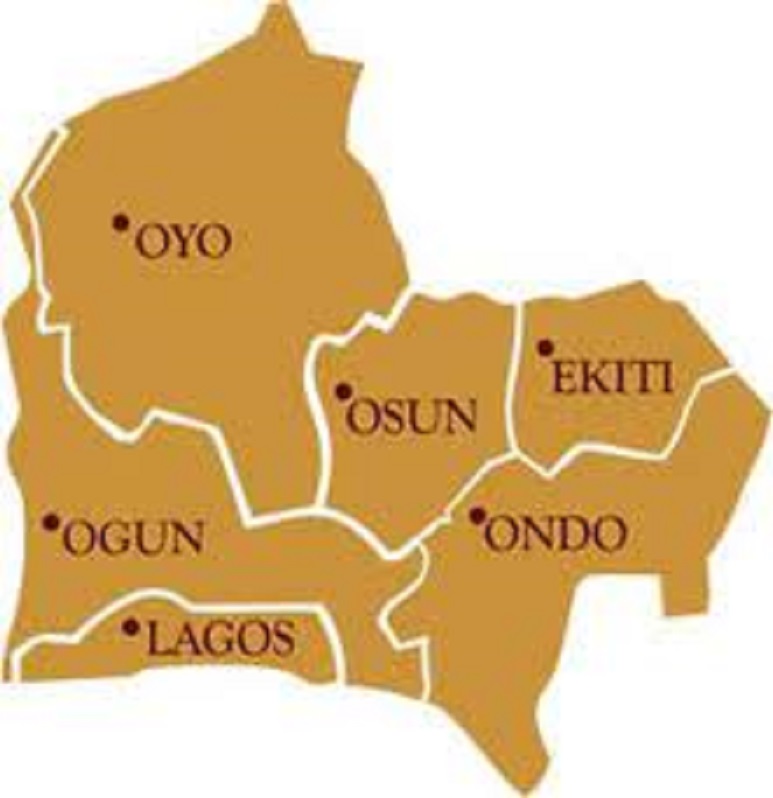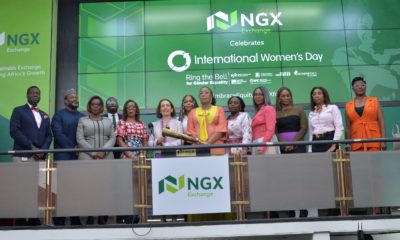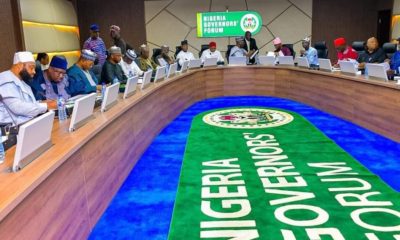Politics
SERAP Sues Tinubu Over Missing $3.4bn IMF Loan

The Socio-Economic Rights and Accountability Project (SERAP) has dragged President Bola Tinubu to court on the $3.4 billion COVID-19 loan from the International Monetary Fund (IMF) which remains unaccounted for.
The SERAP in a statement averred that its action was over “the failure to probe the grim allegations that $3.4 billion loan obtained by Nigeria from the International Monetary Fund (IMF) to finance the budget and respond to COVID-19 is missing, diverted or unaccounted for.”
The anti-corruption crusader made it clear that it action was predicated on information gleaned from the recently published 2020 Nigeria’s annual audited report by the Auditor-General of the Federation.
In the suit number FHC/ABJ/CS/269/2024 filed last Friday at the Federal High Court, Abuja, SERAP is asking the court “to direct and compel President Tinubu to probe the allegations that $3.4 billion loan obtained by Nigeria from the IMF to finance the budget and respond to COVID-19 is missing, diverted or unaccounted for.”
The SERAP is also seeking: “an order of mandamus to direct and compel President Tinubu to ensure the effective prosecution of anyone suspected to be responsible for the alleged mismanagement and diversion of the $3.4 billion IMF loan obtained by Nigeria to finance the budget and respond to the COVID- 19 pandemic.
“An order of mandamus to direct and compel President Tinubu to ensure the full recovery of the missing $3.4 billion IMF loan obtained by Nigeria to finance the budget and respond to the COVID- 19 pandemic.”
In the suit, the SERAP argued that: “Investigating these grave allegations, bringing suspected perpetrators to justice and recovering any missing IMF loan would contribute to addressing the country’s economic crisis and debt burden.”
The SERAP is also arguing that, “The findings by the Auditor-General suggest a grave violation of the public trust, the provisions of the Nigerian Constitution 1999 [as amended], national anticorruption laws, and the country’s obligations under the UN Convention against Corruption.”
According to the SERAP, “Servicing IMF loan that is allegedly missing, diverted or unaccounted for is double jeopardy for Nigerians—they can neither see nor benefit from the projects for which the loan was approved; yet, they are made to pay back both the loan and accrued interests.”
The SERAP is arguing that, “Unless the President is directed and compelled to get to the bottom of these damning revelations, suspected perpetrators would continue to enjoy impunity for their crimes and enjoy the fruits of their crimes.”
The suit filed on behalf of the SERAP by its lawyers Kolawole Oluwadare and Andrew Nwankwo, read in part: “There is a legitimate public interest in ensuring justice and accountability for these serious allegations. Granting the reliefs sought would end the impunity of perpetrators and ensure justice for victims of corruption.
“Granting the reliefs sought would facilitate the effective implementation of the recommendations by the Auditor-General in the 2020 annual report that the missing $3.4 billion IMF loan be fully recovered and remitted to the public treasury and those responsible be ‘sanctioned and handed over to anticorruption agencies’.
“The allegations of corruption in the spending of IMF loan documented by the Auditor-General undermine economic development of the country, trap the majority of Nigerians in poverty and deprive them of opportunities.
“According to the 2020 annual audited report by the Auditor-General of the Federation published last week, the US$3.4 billion emergency financial assistance obtained from the International Monetary Fund (IMF) to finance the budget and respond to the COVID-19 pandemic is missing, diverted or unaccounted for.
“According to the Auditor-General, no information or document was provided to justify the movement and spending of the Fund.
“The Auditor-General has recommended that the money should be fully recovered and remitted to the public treasury and for the evidence of remittance to be forwarded to the Public Accounts Committee of the National Assembly.
“The Auditor-General has also recommended that anyone suspected to be involved should be ‘sanctioned and handed over to the EFCC and ICPC for investigation and prosecution, as provided for in paragraph 3112 of the Financial Regulations’.
“According to SERAP’s information, Nigeria has signed an agreement to spread the repayment of the IMF loan/interests from 2023 to 2027. The first instalment, due in 2023, is worth $497.17 million. The second instalment, due in 2024, will be worth $1.76 billion. The third instalment, due in 2025, will be worth $865.27 million.
“The final two instalments, due in 2026 and 2027, will each be worth $33.99 million. These instalments will only be interest payments.
“Impunity for corruption in the management of loans obtained by Nigeria will continue as long as high-ranking public officials go largely unpunished for their alleged crimes.
“The consequences of corruption are felt by citizens on a daily basis. Corruption exposes them to additional costs to pay for health, education and administrative services.
“The Nigerian government has a sacred duty to ensure that the country’s loans including those obtained from the IMF are transparently and accountably used solely for the purposes for which the loans are obtained, and for the effective development of public goods and services as well as the general public interests.
“Section 13 of the Nigerian Constitution 1999 [as amended] imposes clear responsibility on the Nigerian government to conform to, observe and apply the provisions of Chapter 2 of the constitution. Section 15(5) imposes the obligations on the government to ‘abolish all corrupt practices and abuse of power’ in the country.
“Under Section 16(1) of the Constitution, the Nigerian government has a responsibility to ‘secure the maximum welfare, freedom and happiness of every citizen on the basis of social justice and equality of status and opportunity.’
“Section 16(2) further provides that, ‘the material resources of the nation are harnessed and distributed as best as possible to serve the common good.’
“Similarly, articles 5 and 9 of the UN Convention against Corruption also impose legal obligations on the Nigerian government to ensure proper management of public affairs and public funds including loans obtained by the country, and to promote sound and transparent administration of public affairs.
“The UN Convention against Corruption and the African Union Convention on Preventing and Combating Corruption to which Nigeria is a state party obligate the Nigerian government to effectively prevent and investigate allegations of corruption and mismanagement of public funds including loans obtained by the country.
“Specifically, article 26 of the UN convention requires the Nigerian government to ensure ‘effective, proportionate and dissuasive sanctions’ including criminal and non-criminal sanctions, in cases of grand corruption.
“Article 26 complements the more general requirement of article 30, paragraph 1, that sanctions must take into account the gravity of the corruption allegations.”
Joined in the suit as Respondent is Lateef Fagbemi, the Attorney General of the Federation and Minister of Justice.
No date has been fixed for the hearing of the suit.
Politics
Adeleke Represents SW On Ad Hoc Committee on Nat’l Electrification Plan

The Executive Governors from Nigeria’s South West have unanimously nominated Senator Ademola Adeleke as the chairman of the zone on the National Economic Council (NEC).
Adeleke is the Executive Governor of Osun State, southwest, Nigeria.
This, according to the Spokesperson to Governor Adeleke, Olawale Rasheed, transpired on Thursday, at a meeting of the NEC.
ALSO READ: Adeleke Flaunts Local Content Records, Industrialisation Progress
He noted that the meeting reviewed the state of Nigeria’s electricity sector and resolved to engage subnational structures to address current challenges in the sector.
“The meeting particularly sought to build on the devolution of the electricity sector and its movement into the concurrent legislative list which empowers state governments to regulate the sector in their respective areas,” he stated.
Consequently, the NEC, therefore set up an ad hoc committee to review actions in the sector by state governments and explore ways to ramp up activities through coordination, Rasheed highlighted.
The full list of members of NEC’s Ad-hoc Committee on National Electrification:
- Governor of Cross Rivers State, Bassey Out – Chairman, South-South
- Governor of Katsina State, Mallam Dikko Umaru Radda – Chairman, North-West
- Governor of Gombe State, Muhammadu Inuwa Yahaya – Chairman, North-East
- Governor of Osun State, Senator Ademola Adeleke – Chairman, South-West
- Governor of Imo State, Senator Hope Uzodinma – Chairman, South-East
- Governor of Plateau State, Barr. Caleb Mutfwang – Chairman, North-Central
- Hon. Minister of Finance, Wale Edun
- Hon. Minister of Budget and National Planning, Atiku Bagudu
- Special Adviser, NEC and Climate Change, Rukaiya El-Rufai
- Special Adviser, Power Minister, Hon. Bolaji Tunji
- MD/CEO Rural Electrification Agency, Abba Aliyu
- MD/CEO Niger Delta Power Holding Company, Jennifer Adighije
- Chairman, Nigeria Governors Forum, AbdulRahman AbdulRazak
- NEC Secretariat
Politics
ACF Pledges Support For Northern Presidential Candidates Ahead Of 2027 Elections
The Arewa Consultative Forum (ACF) has announced its decision to back Northern candidates in the 2027 general elections, citing the urgent need to address the worsening socio-economic and security challenges facing the region.
In a communique issued after its National Executive Council meeting in Kaduna on Wednesday, the forum expressed deep concern over the economic state of Northern Nigeria under President Bola Ahmed Tinubu’s administration, attributing the region’s struggles to flawed governance and poor policy decisions.
READ MORE: JUST IN: FG Dissolves Nnamdi Azikiwe University Governing Council, Removes VC
The ACF criticized the Federal Government’s economic policies, describing them as detrimental to the livelihoods of Northern citizens.
According to the communique, signed by the forum’s National Publicity Secretary, Professor Tukur Muhammad-Baba, the policies have compounded the already dire economic conditions in the region.
The statement reads, “Arewa people remain at a great disadvantage, being already worse off economically compared to other parts of Nigeria. While economic reforms are indeed desirable, they should not impoverish the same people they are meant to serve. Policies must have a human face.”
The forum noted that the North faces chronic food insecurity, limited educational and vocational opportunities for youth, and a heavy reliance on small-scale economic activities.
“Livelihoods are currently dependent on micro activities. The region faces acute and chronic food insecurity; its youths lack education and skills training. Daunting as these may be, they can be reversed. The time to think big is now,” the communique emphasized.
The ACF also addressed the pervasive insecurity in the North, warning that the situation has begun to erode public confidence in the government.
“Security is an irreducible minimum of human existence. In this regard, insecurity in its various manifestations remains the most worrisome challenge of Arewa people, that has even started to corrosively undermine the authority of government,” the forum stated.
It condemned the government’s response to the crisis, arguing that the Federal Government has failed to meet its primary duty of safeguarding lives and property.
“That those whose responsibility it is to provide security will be saying they are doing their best is unacceptable,” the communique said. “The minimum duty of government is to safeguard life and property, and doing anything less is a failure.”
The ACF faulted what it described as the “flawed leadership selection process” under the Tinubu administration, claiming it has elevated individuals without the requisite competence or experience to key positions.
It urged the Federal Government to “review, reassess, reevaluate, and re-order the direction of its economic policies with a view to giving it the needed human face.”
Looking ahead to the next general elections, the ACF pledged its support for Northern politicians who demonstrate a clear commitment to addressing the region’s challenges and fostering national development.
“Notwithstanding the parlous state of Arewa’s glaring economic conditions, the policies of the current Federal Government have continued to make matters much worse,” the communique stated.
Politics
No Room For Abandoned Projects – Ganduje Warns Aiyedatiwa
The National Chairman of the All Progressives Congress (APC), Abdullahi Ganduje, has urged Ondo State Governor Lucky Aiyedatiwa to prioritize completing ongoing projects and avoid leaving any abandoned during his second term in office.
Ganduje made the call on Wednesday at the APC’s national secretariat in Abuja after the Independent National Electoral Commission (INEC) presented Certificates of Return to Aiyedatiwa and his deputy, Adelami Olaide.
Governor Aiyedatiwa’s re-election was marked by a sweeping victory in all 18 local government areas of the state during last Saturday’s governorship election.
READ ALSO: JUST IN: Nigerian Beauty Queen, Chidimma Adetshina Quits Peageantry
Ganduje praised the outcome, describing it as a testament to the people’s confidence in the APC-led administration.
“I am happy about the landslide result. The election is not the effort of the elite and middle class alone; it is also through the effort of the grassroots,” Ganduje said. “Out of 203 wards, APC won 202, losing only one ward. This is a victory embraced by all.”
Ganduje highlighted the importance of continuity and urged the governor to leverage his experience from the previous administration led by the late Rotimi Akeredolu.
“As a deputy, you knew how projects were started by your late governor. You were part of it, also as a governor for 10 months, and now as a re-elected governor. For the next four years, you will continue,” he said.
“You know the terrains, geography, and physical landscape of all 18 local government areas. Use these insights to carve out projects that will improve the lives of the Ondo people.”
Meanwhile, Ondo APC Chairman, Ade Adetimehin, commended Ganduje’s leadership and strategic direction, which he credited for the party’s success in the election.
He also expressed gratitude to President Bola Tinubu for his unwavering support for Aiyedatiwa’s candidacy, despite internal opposition from some party stakeholders.
“We have finally killed PDP in Ondo,” Adetimehin declared. “Most of the leaders of that party have defected to the APC. With the landslide victory in this election, it is clear to the whole world that there is no PDP in Ondo.”
He further described Ganduje as a mentor whose leadership had been instrumental in uniting the party and ensuring victory at the polls.
Governor Aiyedatiwa, who succeeded Akeredolu and completed his tenure before securing re-election, has pledged to focus on delivering on his mandate and completing critical projects in his second term.

















